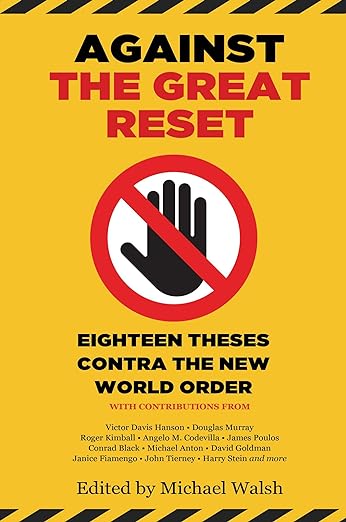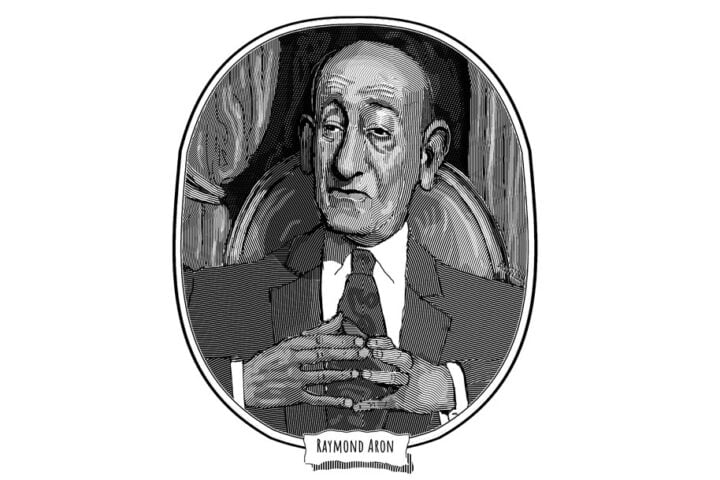Books Reviewed
“You’ll own nothing. and you’ll be happy.” That prediction first appeared in a 2016 essay by the Danish Social Democrat M.P. Ida Auken, who was advertising her vision of centralized property ownership. The same words featured prominently that year in a video created by the World Economic Forum (WEF) to extol its Great Reset program. When the video went viral during the COVID-19 pandemic, many of us learned the phrase “Great Reset” for the first time. Those who objected were immediately tarred as paranoid cranks for noticing that any such thing existed. The Anti-Defamation League denounces what it calls “‘The Great Reset’ Conspiracy” on a page that prominently features a screenshot from the WEF’s own video announcing “The Great Reset” in bold block letters.
“You’ll own nothing” was an ominous promise coming from the WEF, considering that its participants own just about everything. The organization’s founder, Klaus Schwab, has said that “the pandemic represents a rare but narrow window of opportunity to reflect, reimagine, and reset our world.” A now-deleted mission statement read: “As we enter a unique window of opportunity to shape the recovery, this initiative will offer insights to help inform all those determining the future state of global relations, the direction of national economies, the priorities of societies, the nature of business models and the management of a global commons.”
***
In their 2020 book Covid-19: The Great Reset, Schwab and his co-author, French economist Thierry Malleret, wrote that after the pandemic a new world would emerge, “the contours of which are for us to both imagine and draw.” By “us,” they presumably meant the type of people who attend their summits in Davos, Switzerland. At no point in their cliché-ridden manifesto did Schwab or Malleret indicate an intention to consult the general public, let alone seek their consent.
Editor Michael Walsh has organized a formidable attack on this sinister project in Against the Great Reset: Eighteen Theses Contra the New World Order. The Great Reset is no mere conspiracy theory but an actual conspiracy, concocted by fabulously wealthy would-be autocrats. What are their aspirations, and what does it all mean for individuals and nations? Perhaps most importantly, why and how must it be opposed? These are among the questions the book seeks to answer.
Walsh’s popular novels, essays, and non-fiction books have prepared him well to serve as guide and curator. He looked soberly at the reality of dire circumstances throughout history in his most recent book, Last Stands: Why Men Fight When All Is Lost (2020). All may not yet be lost in our day, but the essays that comprise this new collection convey a palpable sense that it soon could be. Against the Great Reset is broken into six parts, each consisting of three essays on a separate aspect of the WEF agenda. The 18 chapters never feel redundant, a fact which speaks well of the contributors’ originality and of Walsh’s taste as editor. Names like Victor Davis Hanson, Conrad Black, and David Goldman jump out from the table of contents to grab the reader’s attention. New Criterion editor Roger Kimball brings his style of refined ferocity to an important essay on “Sovereignty and the Nation-State.” Angelo Codevilla’s contribution, on education, turned out to be his last before his tragic passing (the book is also dedicated to him); that fact alone is reason enough to reserve the book a permanent spot on my shelf.
***
Another storied contributor is essayist and former Trump Administration official Michael Anton. Anton worried in his seminal 2016 piece, “The Flight 93 Election,” that for all their laments about national decline, many conservatives were still unwilling “even to entertain the possibility that America and the West are on a trajectory toward something very bad.” Brexit and the election of Donald Trump convinced the West’s self-appointed elites that voters could not be trusted with something so precious as Our Democracy. The panicked liberal reaction to those mini-rebellions has made Anton’s view still more plausible than it was seven years ago when he first published it on the CRB’s website. The Great Reset is one such reaction, intended to fix in place a set of decaying power relations before the proles can figure out their next move.
From the sin of Eve and the Tower of Babel, to the Year Zero revolutions that tore apart France, Russia, and China, the temptation has never changed: “Ye shall be as gods.” The catastrophic failure of every previous attempt to mount the divine throne is apparently no deterrent to the next try. Often the advent of new technology seduces revolutionaries into the fantasy that things will be different this time. As American Mind executive editor James Poulos points out, “The history of the Great Reset is a technological one.” Human nature stood like a boulder in the path of every world-builder from Robespierre to Pol Pot, but digital technology holds out the prospect that the old stumbling block might be overcome. Smartphones have made us all cyborgs-by-proxy. Information, jobs, politics, and personal relationships are increasingly accessible only through the internet. By placing a programmable technology between us and many of life’s fundamental concerns, today’s tech utopians believe they have gained root access to the human mind and spirit.
***
Stalin once asserted that “no ruling class has managed without its own intelligentsia.” But Americans may rightly object that we have managed just fine without appointing our philosophers as kings. Tom Wolfe once told a story about an astronaut in the Apollo program who, in his first message to ground control after emerging from the dark side of the moon, asked whether his favorite baseball team had won their game while he was incommunicado. The moon landing was undoubtedly one of humanity’s great achievements. Our nation will be honored for it by reverent historians a thousand years from now. But when the space race emerged as the defining challenge of the age, Americans did not look to the Society of the Cincinnati for leadership. They turned to middle-class scientists, engineers, and pilots educated at Midwestern public universities, men of deeds who drank beer at backyard barbecues between missions.
Our people put their faith in competence and determination, not in academic expertise. The reason liberal intellectuals spent the 20th century denouncing American philistinism and coyly signaling their approval of the Soviet Union was that, as the poet Czesław Miłosz wrote, “never since the Middle Ages had [the intellectual] felt himself so necessary and recognized” as in Communist societies. This is why the COVID pandemic was, as the actress Jane Fonda noted with delight, “God’s gift to the Left.” By the 1970s, progressive intellectuals and political agitators had delegitimized themselves in the eyes of many Americans. But their trust in other institutions—especially the scientific establishment—emerged from those years more or less intact. The pandemic allowed politicians and bureaucrats to make, in the recent words of Supreme Court Justice Neil Gorsuch, “the greatest intrusions on civil liberties in the peacetime history of this country,” all while pretending to be “above” politics.
In his essay “China, COVID-19, Realpolitik, and the Great Reset,” British author Douglas Murray recounts the galling hypocrisy and dissimulation that defined the official response to the pandemic. Images of masked servants waiting on unmasked celebrities at a posh birthday party for Barack Obama are burned into our collective memory. A once-esteemed medical journal, The Lancet, published an article in February 2020 to denounce as a conspiracy theory the suggestion that COVID-19 had leaked from a laboratory in Wuhan, China. Its author was Peter Daszak, president of the nonprofit EcoHealth Alliance. That organization later turned out to have received millions of dollars in grant money from Anthony Fauci’s National Institutes of Health, subcontracting out hundreds of thousands to none other than the Wuhan Institute of Virology.
***
Public health officials pointed frantically to a model created by Professor Neil Ferguson of Imperial College London, predicting catastrophic death tolls in the absence of totalitarian restrictions. The model turned out to be bunk, and Ferguson was caught breaking London’s lockdown to meet his mistress. And who can forget the 2020 Summer of Love? By the time public health officials put their stamp of approval on the George Floyd protests, my wedding, which had been scheduled for April 2020, had already been canceled. But the silver lining, I remarked to my fiancée at the time, was that they could not possibly order us back into our homes once the riots were over. It turned out that the joke was on me. Indeed, it was on all of us.
A Cold War-era punchline had it that Stalinist agricultural reforms were only a failure if one imagined that their main purpose was to supply the population with food. The real goal was control, and that goal was achieved—at least for a while. So it is with the Great Reset: taken together, these essays show that power is the common theme of all the many initiatives that travel under the WEF banner. Power as an all-consuming aim is what binds together the bureaucratic functionaries and lordly technocrats of Davos; it is the singular and simple motive behind all their misdirection and their pseudo-erudite jargon. They are all jockeying for their respective fiefdoms, large or small, in the worldwide dominion they hope they will establish together. The authors of Against the Great Reset have exposed the ambitions of these conspirators for what they are with punishing clarity, showing how they can—and must—be opposed.





